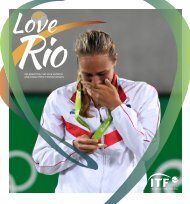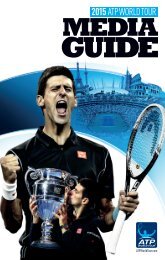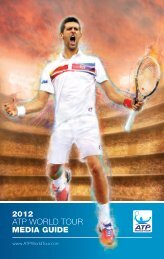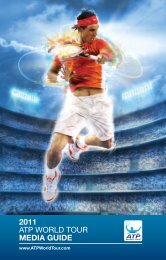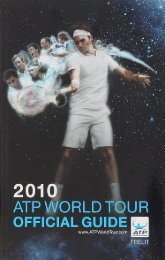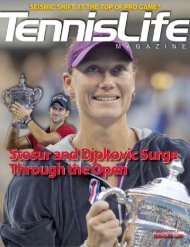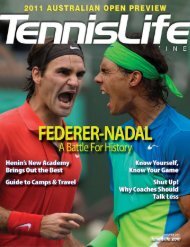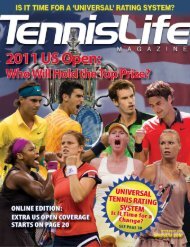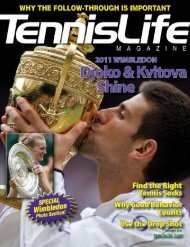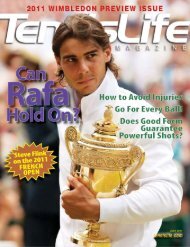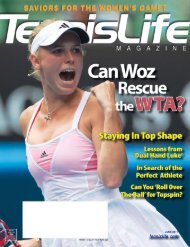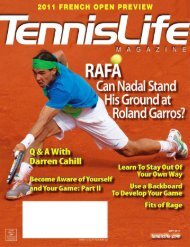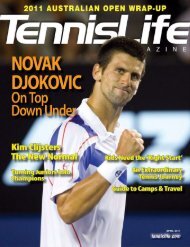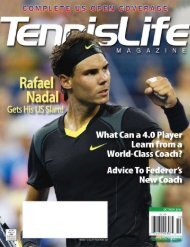A Champion's Mind - Pete Sampras
www.tennismoscow.me Insta:TENNISMOSCOW
www.tennismoscow.me Insta:TENNISMOSCOW
You also want an ePaper? Increase the reach of your titles
YUMPU automatically turns print PDFs into web optimized ePapers that Google loves.
I wasn’t very flamboyant. They weren’t sure what I really had in the way of grit, and didn’t understand the<br />
degree to which I was a fighter. Unlike Connors, I had made no widely disseminated remarks about<br />
leaving my guts out there for them. Being typically skeptical New Yorkers, they had never been sure what<br />
they were buying.<br />
After the Corretja match, they were finally sold.<br />
I went on to win the U.S. Open (my eighth major) of 1996 but I was troubled by how I got sick on the<br />
court, and how weak and ill I felt. I thought back to the ulcer that went undiagnosed earlier in my career,<br />
and wondered if something else might be wrong. Was this a physical problem, or a mental one related to<br />
the stress I put myself under when I decided to try to shoot the moon in tennis?<br />
It had freaked me out that I went all the way to the Open before I bagged my slam. I had set a high bar<br />
for myself in previous years, and you never really want to lower it—you want it to stay in the same place,<br />
or go higher. Maybe I was getting a little obsessive and unrealistic; maybe I was setting myself up for an<br />
inevitable fall. But I couldn’t help myself. I would finish number one for the fourth consecutive year, just<br />
one behind Jimmy Connors’s record of five. I realized I wanted that record but, unlike, say, winning<br />
Wimbledon or the Davis Cup, getting it meant two more years of struggle. Two more years of, first of all,<br />
playing enough tournaments to keep myself in the hunt.<br />
I talked all this over with Paul; I told him what I wanted to accomplish. We decided that I needed to<br />
take a few steps back, think over my mental and physical approach to the game. I needed to pace myself,<br />
without losing drive or intensity. I had to embrace the mission, but not put too much pressure on myself,<br />
because that would tear me up inside. Was it possible to reconcile all those conflicting desires? We didn’t<br />
really have an answer, but we agreed that the first thing I needed to do was get myself checked out,<br />
physically. In the back of my mind was a word that I feared a little, and had chosen not to deal with:<br />
thalassemia.<br />
As I’ve noted, this mild form of anemia afflicts people of Mediterranean descent. It causes fatigue,<br />
especially in the heat, and I’d certainly battled listlessness and loss of desire on some very hot days—<br />
including during my seminal first win at Wimbledon. But you know, nobody wants to go to a doctor and be<br />
told that he’s got something wrong, something that would justify underperforming. I knew that thalassemia<br />
occurred in my family. My mother, Georgia, and sister Stella have it, although the <strong>Sampras</strong> men do not. I<br />
chose to ignore the possibility that I suffered from it until right after the Corretja match.<br />
Within days of testing, blood work revealed that my red blood cell count was abnormally low—a sure<br />
sign that I was suffering from the condition. It wasn’t life-threatening, but it could certainly affect my oncourt<br />
performance. However, it was easily addressed. I had to start taking iron supplements and ramp up<br />
my intake of meat, eggs, and other protein.<br />
This would have been just something else to deal with until Tom Tebbutt, an enterprising journalist and<br />
tennis nut from Toronto, broke a story in Tennis Week, a small bimonthly magazine published out of New<br />
York City. He speculated that I suffered from . . . thalassemia. I have to hand it to Tom; he did his<br />
homework. I was a little annoyed, but I had to be impressed. Somehow he had heard about the disorder<br />
and started poking around. He had a doctor and some other folks confirm that thalassemia could easily<br />
have been a factor in my breakdown in the Corretja match. Then he just connected the dots and nailed me.<br />
I don’t recall that Tom ever tried to confirm the story with me before it was published, but that was<br />
okay. I would have denied it—as I did after the story came out. I felt bad; I tried never to flat-out lie, but I<br />
also wasn’t about to admit to having it. I just didn’t want my rivals to have that information and take<br />
comfort in or motivation out of it in any matches I might play in the future. In fact, the first person I<br />
eventually admitted it to was <strong>Pete</strong>r Bodo—my collaborator for this book—in an interview for Tennis<br />
magazine that we did in September of 2000.



